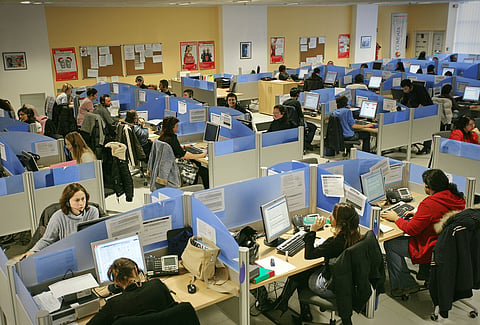
- NEWS
- the EDIT
- COMMENTARY
- BUSINESS
- LIFE
- SHOW
- ACTION
- GLOBAL GOALS
- SNAPS
- DYARYO TIRADA
- MORE

The IT and Business Process Association of the Philippines (IBPAP) stated that American investors are unfazed by the upcoming U.S. Presidential Election on 5 November, affirming that the Philippines remains a key workforce hub for U.S.-based companies.
“They always expand in the Philippines regardless of the administration. Therefore, there are no immediate concerns we have heard from them,” said Celeste Ilagan, chief operating officer of IBPAP, at the sidelines of a forum concerning the new results of the study of the Center for Strategic and International Studies (CSIS) on US investments in the Philippines at the Shangri La EDSA in Mandaluyong City on Monday.
Ilagan noted that the IT-BPM sector is projected to generate $38 billion this year, with an estimated workforce of 1.82 million by the end of 2024.
“We are confident in the growth of the IT-BPM industry as well as some aggressive growth targets in terms of employment and service export revenue,” Ilagan maintained.
According to a report by The Guardian on Monday (Manila time), Democratic candidate Kamala Harris currently leads among early voters in US battleground states, with over 77.6 million votes already cast and less than 48 hours remaining until Election Day.
The Democratic candidate had an 8-percent lead among those who have already voted, while her opponent, Donald Trump, is ahead among those who say they are very likely to vote but have not yet done so, the report said.
The IT-BPM sector was highlighted in the CSIS study as a vital component of U.S.-Philippine economic ties. CSIS Southeast Asia Program research fellow Japhet Quitzon emphasized that U.S. investment has been pivotal in the sector’s development in the Philippines.
The study noted that U.S. firms have increasingly outsourced services to the Philippines due to its young, tech-literate, and largely English-proficient workforce, creating an ideal environment for IT-BPM investment.
From 2014 to 2023, U.S. foreign direct investment in Philippine professional, scientific, and technical services totaled nearly $5.2 billion, the study revealed. It also found that U.S.-owned IT-BPM firms, such as American Express, Synchrony, and Accenture, rank highly on employee-rated lists of best workplaces in the Philippines.
Currently, the IT-BPM sector is concentrated in urban centers such as Bacolod, Cebu, Clark, Davao, and Iloilo. However, the Philippine government’s Digital Cities 2025 initiative aims to promote digital literacy and skills training in rural areas, further boosting the country’s appeal as an IT-BPM hub.
Aside from IT-BPM, the CSIS study outlined other sectors where the U.S. is actively investing, including renewable energy, semiconductors, agriculture, defense and aerospace manufacturing, critical minerals, electric vehicles, and logistics and shipping.
Nevertheless, the study highlighted the need to address institutional barriers to U.S.-Philippine trade and investment. In the United Nations Conference on Trade and Development’s World Investment Report 2023, the Philippines ranked sixth in Southeast Asia for foreign direct investment inflows. The Marcos administration aims to improve the country’s rank to second by 2028.
The 2022 amendment to the Public Service Act, effective in 2023, permits full foreign ownership in sectors such as airports, railways, and telecommunications, creating new opportunities for foreign investors. Similarly, amendments to the Foreign Investment Act now allow foreign investors to fully own domestic enterprises, facilitating market entry.
“In 2024, the House of Representatives and Senate debated whether to amend the constitution to promote foreign investment. But those efforts have stalled until at least the 2025 midterms,” the study added.
